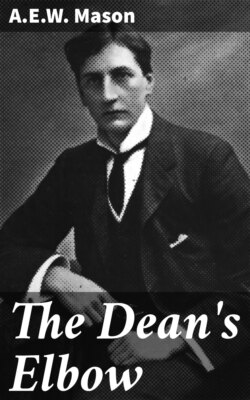Читать книгу The Dean's Elbow - A.E.W. Mason - Страница 6
На сайте Литреса книга снята с продажи.
* * * * *
ОглавлениеTable of Contents
The house of Mardyke and Campion now covers many thousands of square feet along the by-pass road from London to Slough; but it has lost something of the national significance which it had when it straggled in obscurity at the back of Brooke's Market. For it was the first of all the houses in the world to devote itself to the composition of synthetic dyes. It was already forcing the indigo planters of Assam to ponder for what other industry their land was suitable. It was beginning to put beautiful fabrics within the reach of meagre purses. And since the priceless result of a new industry is often a quite unexpected product, like coal tar from gas, so it was with the makers of synthetic dyes. For by filling the bazaars of the East, from Bagdad to Marrakesch, with the gay colours which give a lively pleasure and enhance good humour, they promoted peace, more surely than treaties could amongst the fanatical children of the sun.
This first firm owed its origin to the insight and adventurous spirit of a Manchester broker, Stuart Campion. Two almost simultaneous discoveries seized upon his imagination, one by Professor Perkins that by oxidation a dye which he called "mauve" could be obtained from crude aniline, the other by Professor Mansfield that benzine could be so separated from coal tar as to give the crude aniline necessary to Perkins. Stuart Campion was inspired to dream of a day not distant when new and as yet nameless shades of colour would add a delicate and joyous amenity to the world—whilst bringing in a handsome profit to the benefactors. He sought and obtained the co operation of Philip Mardyke, a wealthy cloth manufacturer of Bradford, who, by backing one or two unsuccessful musical comedies in the Strand, had shown that he, too, hankered after more colour in his life than the Yorkshire fells afforded him.
The land was bought at the back of Brooke's Market, the laboratories equipped; and Mardyke and Campion set out upon their adventure in the spirit of Queen Elizabeth's sailors. But Queen Elizabeth left her adventurers free. Mardyke and Campion were en tangled at once amongst the traps which our modern governments set for nascent industries. Antiquated patent laws and restrictions on the use of alcohol hampered England, but did not hamper a Germany already equipped for commerce based upon chemical science. By the year 1884 Germany had snatched the lead; the sole owner of Mardyke and Campion was William Mardyke the son of Philip, middle-aged and timorous; and its chief chemist was Mark Thewliss, a man with a brilliant record from Dulwich College and the London University, who caused his employer many hours of agitation.
"A buccaneer, sir," said Mr. William Mardyke across the dinner table to his cronies, banging his fist with the flighty exasperation which he dared not show to his chemist. "A man without reverence. A gambler too! Gad, what he has cost me this year!"
The natural question was asked.
"Why don't you get rid of him, then?"
Mr. William Mardyke had no answer ready. He took refuge in vaguenesses.
"Not so easy—no—not so easy as you think. But some day—yes—some day," he said darkly.
